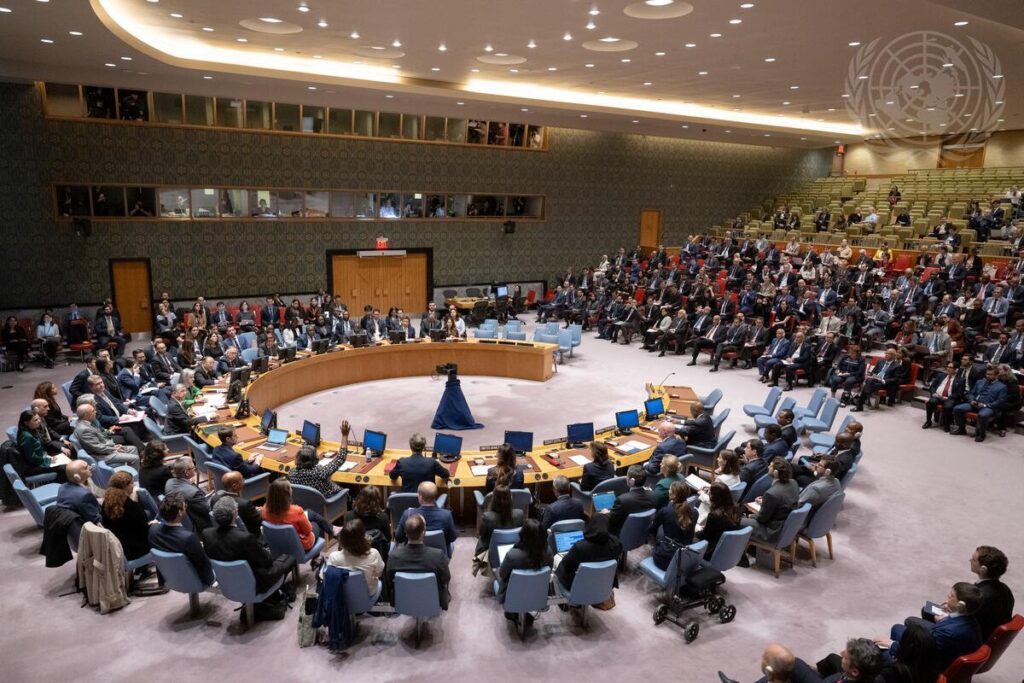New York, March 25, 2024 – Breaking its own deadlock for a solution since the Israel-Hamas war broke out five months ago, the UN Security Council voted 14-0 to demand an immediate cease-fire to be respected by all parties during the month of Ramadan and leading to a “permanent, sustainable cease-fire.”
The resolution also demanded “the immediate and unconditional release of all hostages, as well as ensuringhumanitarian access to address their medical and other humanitarian needs” and “that the parties comply with their obligations under international law in relation to all persons they detain.” The Ramadan began on March 10 and will end on April 9.
The resolution called for “the urgent need to expand the flow of humanitarian assistance to and reinforce the protection of civilians in the entire Gaza Strip.”
The US abstained when the 15-nation council voted 14-0 on the resolution, which was drafted by the council’s 10 elected member states, which are Algeria, Ecuador, Guyana, Japan, Malta, Mozambique, South Korea, Sierra Leone, Slovenia, Switzerland.
The council had not been able to adopt a resolution to demand a cease-fire because of division among the five permanent members. On March 22, Russia and China voted against a US-backed draft resolution that did not directly call for a cease-fire of the Israel-Hamas war and the two countries accused the US of “deliberately misleading the international community” and “playing a game of words” in the face of suffering by the Palestinian people in Gaza.
The negative votes by Russia and China amounted to a veto of the US draft resolution despite the fact that 11 of the 15 council members voted in favor. Russia, China and Algeria voted against. One country abstained: Guyana.
The 11 countries are: Ecuador, France, Japan, Malta Mozambique, South Korea, Sierra Leone, Slovenia, Switzerland, the United Kingdom and the US.
The US, China, Russia, France and the United Kingdom are permanent members of the UN Security Council and have the power to veto decisions by casting a negative vote. The other 10 members are elected to serve two-year terms.
The US draft resolution said it was “imperative” for “an immediate and sustained ceasefire to protect civilians on all sides” in order to facilitate essential aid delivery and support talks between Israel and Hamas militants to create a sustainable end to the hostilities and to the release of all hostages.
US Ambassador Linda Thomas-Greenfield, who introduced the draft to the council, said before the vote that the US wants to see “an immediate and sustained ceasefire.” But, “we have to do the hard work of diplomacy” to make that aim a reality and it has to be made “real on the ground”.
“This is why the negotiations are going on in Qatar which will lead to a sustainable cease-fire,” she said, “but we are not there yet unfortunately.”
In addition to making an immediate and sustained ceasefire “imperative” to protect civilians, the draw would have called for an “urgent need to expand the flow of humanitarian assistance” to all civilians and lifting “all barriers” to delivering aid at scale to Gazans.
The draft would call on Israel and all armed groups to comply with their obligations under international law, providing protection for humanitarian workers and medical personnel. It also would condemn all acts of terrorism including the Hamas-led attacks of 7 October, the taking and killing of hostages, murder of civilians, sexual violence and condemns the use of civilian buildings for military purposes.
Russia’s Ambassador Vassily Nebenzia said the US draft did not call for a cease-fire and accused the US of “deliberately misleading the international community.” He also accused the US of “selling a product” to the council by using the word “imperative” in the text.
China’s Ambassador Zhang Ju said the U.S. proposal did not promote an immediate and sustained cease-fire, set preconditions and fell far short of expectations of council members and the broader international community.
“If the U.S. was serious about a cease-fire, it wouldn’t have vetoed time and again multiple council resolutions,” he said. “It wouldn’t have taken such a detour and played a game of words while being ambiguous and evasive on critical issues.”
Since the Israel-Hamas war broke out on October 7, 2023, with the surprise attack by Hamas militants against Israel, the council has failed to stop the war or order a humanitarian cease-fire because of the division among the five permanent members.
The US has vetoed three resolutions demanding a cease-fire, with the most recent an Arab-backed measure supported by 13 council members with one abstention on February 20 this year. (By J. Tuyet Nguyen)
United Nations correspondent journalists – United Nations correspondent journalists – United Nations correspondent journalists – United Nations journalism articles – United Nations journalism articles – United Nations journalism articles – United Nations News – United Nations News – United Nations News

